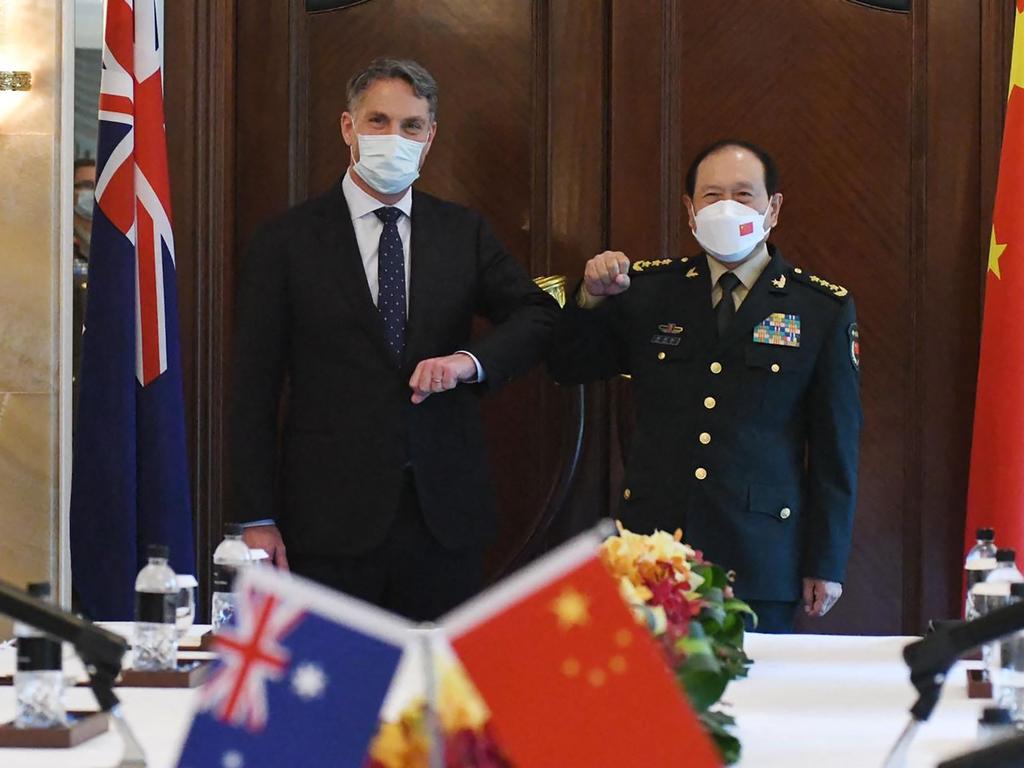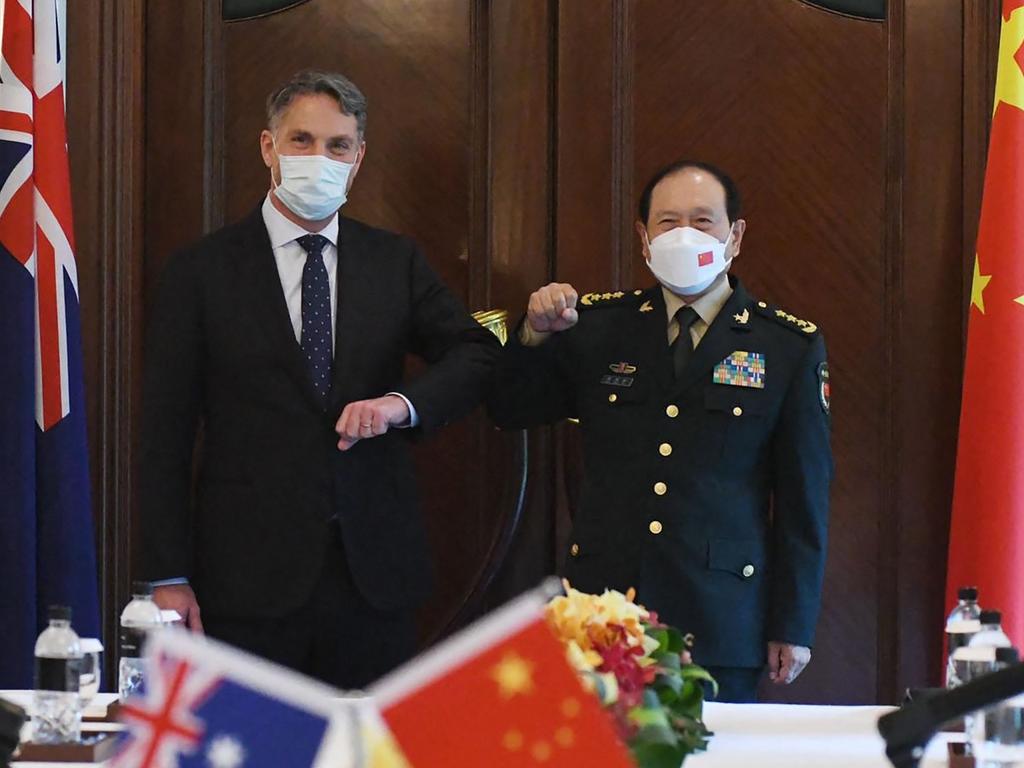China dialogue begins but Labor holds firm on national interest


New Defence Minister Richard Marles got the balance right at the Shangri-La Dialogue in Singapore last weekend, sitting down with China’s Defence Minister, Wei Fenghe, in a meeting hosted by China that lasted an hour where both sides listed their concerns – a meeting that ended the Beijing-imposed freeze on ministerial contacts with Australia lasting nearly three years.

This was a meeting without concessions from Australia. That was essential. Being able to talk with China is a breakthrough event and a distinct diplomatic gain for Labor. It can be assumed the key was the removal of the Morrison government. This is a reopening of dialogue; it is neither a reset of relations nor a change of policy.
On display is a new Labor government that brings a different tone to relations with China, that will work harder at diplomacy but cannot make any strategic concessions given China’s prolonged campaign under President Xi Jinping to shift the regional and global balance in its favour and against Australia’s interests.
Almost as important as the meeting itself was its presentation by Marles – he welcomed the dialogue as “important” but said “there is absolutely no change in the substance of Australia’s national interest”, pointing to broad policy continuity with the Morrison government. Marles neither exaggerated the significance of the meeting nor suggested it was a concession by Beijing. That would have been folly.
Marles said there was a “very frank and full exchange” and saw the meeting as “a critical first step” with Australia intending to proceed “in a very sober and very deliberate manner”. He didn’t underestimate the difficulties. He said Australia wants a “productive relationship with China”, acknowledged that under Labor “there is a change of tone” but said Australia would not “waver” in asserting its national interest “in the strongest possible terms”.
Anthony Albanese was emphatic on Tuesday. Dialogue was “always a good thing” but the onus for policy change rested with China given its trade coercion against Australia. “We do need to engage with each other,” the Prime Minister said. “And that’s a positive step. But it is China that has imposed sanctions. It is China that has changed. And it’s China that needs to remove those sanctions.”
Albanese said there was “no reason” for the sanctions. Labor awaits constructive steps from China. The government cannot make any substantial move to improve relations while trade sanctions remain. That is non-negotiable in terms of public opinion.
How far will China go? The problem is that Beijing’s removal of sanctions would be an admission of its failure – a concession that its brutal campaign of trade intimidation to break Australia’s will had been thwarted by the strength of the Morrison government reinforced by domestic political bipartisanship.
Labor is now embarked on what probably becomes a new phase in Australia-China relations where Beijing will test the mettle of the Albanese government. Marles said both sides wanted to get “the entire bilateral relationship” into a better place.
It is early days but the omens are encouraging – Albanese, so far, displays a welcome judgment on foreign policy and the combination of Marles as Defence Minister and Penny Wong as Foreign Minister opens the prospect of a formidable team with initiative, energy and maturity.
The pace on foreign relations has been impressive. There are no sudden policy reversals but there is a new government with a fresh approach keen to leave its mark where the Morrison government had faltered – investing the Pacific with a greater urgency, settling the $835m compensation to Naval Group over submarines, thereby repairing relations with France, and seeing the reopening of dialogue with China.
Yet the juxtaposition is sharp. The new dialogue comes in the context of China’s push for a regional security agreement with Pacific nations, its security agreement with Solomon Islands and the recent Putin-Xi pact against the US and the West in the prelude to the Ukraine war where their partnership had “no limits”.
The government has chosen a tight, traditional message on Taiwan. “We have a one-China policy,” Marles said. “We do not support Taiwanese independence. We don’t support any unilateral action on either side of the Taiwan Strait which would change the status quo.” He won’t address hypotheticals about war over Taiwan or Australia’s role. Asked by Bloomberg whether he was worried about World War III, Marles said: “I’m not going to speculate on that.”
The rhetoric is dialled down. Reducing the domestic political heat on China relations is the sound choice. But Albanese, Wong and Marles know this is a power contest.
In his Shangri-La speech Marles said: “When it comes to the security and stability of our own region, there will be continuity in Australian defence policy.”
He said the US alliance “has never been more important” to Australia. The Australian Defence Force “will always be there” for our Pacific neighbours; Australia will seek “tighter” military ties with Southeast Asia; he raised with his Chinese counterpart the importance “of not militarising the Pacific” since Australia thinks this is exactly what China seeks. Australia will continue to “assert our rights” in transits through the South China Sea.
On AUKUS, Marles sent three crucial messages. First, Australia wants to project power in the region and there is “no more important platform” than a “long-range” submarine capability. Second, having “nuclear propulsion is fundamental to that”. Third, the government will confront the capability gap before the nuclear-powered submarines arrive. In short, Labor is pledged to strategic partnership with our allies to counter the rise of China. These are pivotal commitments.
Marles has repudiated the claim by new Liberal leader Peter Dutton in this paper that in his negotiations as defence minister the US was prepared to facilitate delivery to this country of two Virginia-class nuclear-powered submarines off its production line by 2030, thereby ensuring there would be no need to build another version of Collins-class submarines to fill the gap.
This is an explosive claim with vast political ramifications. It has been debunked by submarine experts in Australia and the US. Marles said Dutton’s claims were “not based in the facts” as he understood them. Marles said the government would assess all options with the US and Britain. Labor believes Dutton’s remarks are a bid to “set it up” and that the early delivery of Virginia-class subs is not a tenable proposition.
The opposition needs to be careful. Before the election, bipartisanship on AUKUS was deemed to be essential in the nation’s interest. If the opposition plans to turn AUKUS into a domestic political issue, that will have lots of risky consequences and won’t necessarily help the Liberal Party.






A change of government always constitutes a political and diplomatic opportunity – both China and Australia have now decided to talk at ministerial level while the strategic competition between the two nations intensifies in a world shaped by deepening rivalry between China and the West.